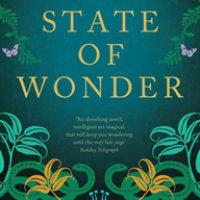One of the most effective elements of this altogether excellent novel is Patchett’s rich, evocative descriptions of its setting – the jungle’s suffocatingly dense foliage and “neon colored frogs…that contained enough poison in their clammy skins to take down twenty men” and the “murky soup” of the river, which was worse because “there was no telling what was coming at you”.
Throughout the novel, Patchett simultaneously makes the Amazon appealingly exotic and prohibitively threatening.
“The scientists all agreed that they had never been deep into the jungle for more than eight minutes without thinking they would give everything they owned to be led safely out.”
In fact, the book begins with the death of a scientist. The oppressive conditions of the jungle prove to be too much for Dr Anders Eckman, who was sent to Brazil by pharmaceutical company Vogel. His mission: to ascertain the status of a drug currently in development by Dr Annick Swenson, a maverick researcher who has been troublingly uncommunicative the progress of her work.
The drug in question is based on Dr Swenson’s discovery of a remote village where women can bear children well into their 70s. It could be “the end of IVF”. Vogel’s CEO is getting impatient for the huge profits the finished drug promises, so, upon hearing of Dr Eckman’s death, he doesn’t hesitate to send his colleague (and secret girlfriend) Marina to the Amazon to look into it.
Marina doesn’t want to go – she has “developed a profound desire to stay” in her native Minnesota – but feels an obligation to her friend and his widow. Bland and insecure, Marina is by far the least charismatic character in the novel and is not a particularly engaging protagonist. This can spell failure for a novel, but in this case, her character works terrifically as a foil to the formidable Dr Swenson, when we finally meet her.
By far the novel’s most interesting character, Dr Swenson steals every scene she appears in and makes the second half of the book stronger than the first. She is forbidding and (justifiably) arrogant, and Marina is (not surprisingly) terrified of her. Dr Swenson pulls no punches, and the uneven dynamic that develops and evolves between them becomes the backbone of the book. From their very first conversation, the dialogue between Swenson and Marina is gripping, particularly when they debate the ethical issues raised by their research, such as pharmaceutical inference with the natural order and westerners’ tendency to intervene in and impose themselves on other cultures.
During one such discussion, Dr Swenson defends her reluctance to treat the Lakashi people’s medical ailments with western medicine, asserting:
“The question is whether or not you choose to disturb the world around you, or if you choose to let it go on as if you had never arrived. That is how one respects indigenous people. If you pay attention at all you’ll realize that you could never convert them to your way of life anyway… Any progress you advance to them will be undone before your back is turned. You might as well come down here to unbend the river. The point, then, is to observe the life they themselves have put in place and learn from it.”
As Marina observes this way of life, she comes to understand the complexities of Dr Swenson’s reasons for so fiercely protecting her research.
State of Wonder has a bit of everything – romance and adventure, dark pasts, hidden agendas, Big Issues – but doesn’t ever turn into a soap opera or spread itself too thin. There is one improbable plot twist at the end, and the sci-fi premise at the centre of the novel – that special tree bark significantly extends these fictional tribeswomen’s child-bearing years – could have been off-puttingly outlandish, but somehow Patchett makes it work.
Well imagined and beautifully written, State of Wonder is escapist fiction at its best.
Rating: 4 stars out of 5
State of Wonder
By Ann Patchett
Paperback, 400 pages, RRP $19.99
ISBN: 9781408834671
Allen & Unwin/Bloomsbury





